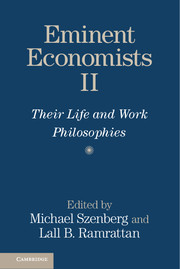Book contents
- Frontmatter
- Dedication
- Contents
- List of Contributors
- Foreword
- Preface and Acknowledgments
- Introduction
- 1 Being There: An Intellectual Journey
- 2 Social Norms in Economics and in the Economics Profession
- 3 Personal Reflections on My Professional Life
- 4 Gray Eminence?
- 5 Biochemist to Economist
- 6 Puzzles and Paradoxes: A Life in Applied Economics
- 7 Succeeding in Economics
- 8 My Research Strategy
- 9 My Philosophy of Economics, Life, and Everything (Not!)
- 10 Finding a Niche
- 11 Become an Economist – See the World
- 12 Practitioner of the Dismal Science? Who, Me? Couldn’t Be!!
- 13 One Job, Four Careers
- 14 My Life and Research Strategy
- 15 How I Ended Up Being a Multifaceted Economist and the Mentors I Have Had
- 16 Searching for My Personal Philosophy
- 17 Learning about the Evolving International Economy
- 18 Confessions of a Wellesley FEM
- 19 God, Ants, and Thomas Bayes
- 20 The Path of a Monetary Economist
- 21 Learning from the Field
- 22 Order in and through Disorder: The Invisible Hand as a Turbulent Regulator
- 23 The Education of an Economist
- 24 Faith, Science, and Religion
- 25 My Studies in International Economics
- 26 Sailing into the Wind
- 27 My Life and Work Philosophy
- 28 Scaling Fortress Economics
- 29 The Accidental Economist
- Index
6 - Puzzles and Paradoxes: A Life in Applied Economics
Published online by Cambridge University Press: 05 June 2014
- Frontmatter
- Dedication
- Contents
- List of Contributors
- Foreword
- Preface and Acknowledgments
- Introduction
- 1 Being There: An Intellectual Journey
- 2 Social Norms in Economics and in the Economics Profession
- 3 Personal Reflections on My Professional Life
- 4 Gray Eminence?
- 5 Biochemist to Economist
- 6 Puzzles and Paradoxes: A Life in Applied Economics
- 7 Succeeding in Economics
- 8 My Research Strategy
- 9 My Philosophy of Economics, Life, and Everything (Not!)
- 10 Finding a Niche
- 11 Become an Economist – See the World
- 12 Practitioner of the Dismal Science? Who, Me? Couldn’t Be!!
- 13 One Job, Four Careers
- 14 My Life and Research Strategy
- 15 How I Ended Up Being a Multifaceted Economist and the Mentors I Have Had
- 16 Searching for My Personal Philosophy
- 17 Learning about the Evolving International Economy
- 18 Confessions of a Wellesley FEM
- 19 God, Ants, and Thomas Bayes
- 20 The Path of a Monetary Economist
- 21 Learning from the Field
- 22 Order in and through Disorder: The Invisible Hand as a Turbulent Regulator
- 23 The Education of an Economist
- 24 Faith, Science, and Religion
- 25 My Studies in International Economics
- 26 Sailing into the Wind
- 27 My Life and Work Philosophy
- 28 Scaling Fortress Economics
- 29 The Accidental Economist
- Index
Summary
Starting Out
My father believed in education, and he liked to measure things. He grew up in a mining village in Yorkshire, between the First and Second World Wars. He was bright and motivated, but the school system was designed not for education but to produce workers for the “pit,” and only one child in each cohort was allowed to progress to high school. Not my father, who got in the line to be a miner, then was drafted into the army in 1939 and drafted out again with tuberculosis before war’s end. In the easy labor market of those days, he got a job with a firm of civil engineers. The managing partner was impressed by my father’s skill with a slide rule and a theodolite, and was prepared to ignore his lack of formal education. My father went to night school at what is now the Heriot-Watt University in Edinburgh, graduating after very many years as a civil engineer. He married my mother, the daughter of a carpenter. She had a great gift for storytelling; it is said that Sir Walter Scott would walk over from Abbotsford to our house in Bowden to share tales with one of her ancestors. Even so, she did not share her spouse’s view of education; she found it hard to see me with a book when I could have been using my hands. But my father was determined that I should be educated properly and set his heart on sending me to Fettes College, a famous public school (in the British sense) in Edinburgh, whose annual fees were well in excess of his salary, even once he became the water supply engineer for the county of Roxburgh in the Scottish borders. Then, and perhaps even now, there were schoolteachers in the Scottish state schools who were prepared to coach a bright kid for a scholarship that would take him away, and to do so in their own time.
- Type
- Chapter
- Information
- Eminent Economists IITheir Life and Work Philosophies, pp. 84 - 101Publisher: Cambridge University PressPrint publication year: 2014
- 5
- Cited by



